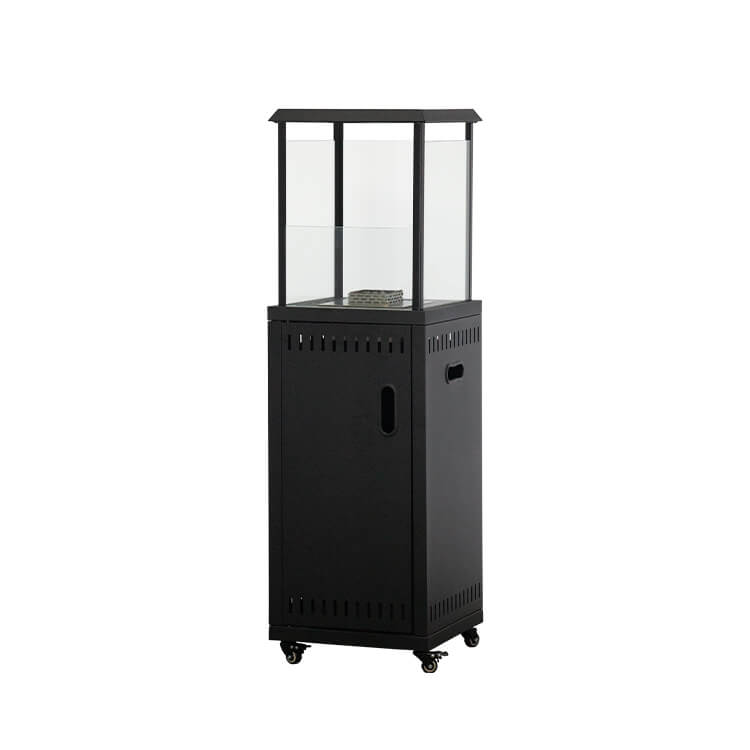-
Q Can pellet patio heaters be used year-round?
A Pellet patio heaters can typically be used year-round, depending on weather conditions and personal preferences.
Some models may offer additional features, such as adjustable settings or weatherproof construction, to enhance their usability in different seasons.
-
Q Are pellet patio heaters suitable for use in all climates?
A Pellet patio heaters can provide effective warmth in various climates, but their performance may be affected by factors such as temperature, humidity, and wind conditions.
In extremely cold or windy climates, supplemental heating options may be necessary to achieve desired comfort levels.
-
Q How do I choose the right size pellet patio heater for my outdoor space?
A Consider the size of your outdoor space and the level of heat output required to adequately warm it.
Consult manufacturer guidelines and recommendations to determine the appropriate size and capacity for your needs.
Factors such as climate and wind conditions may also influence your choice of heater size.
-
Q Can I use other types of fuel in a pellet patio heater?
A Pellet patio heaters are designed specifically to burn wood pellets and should not be used with other types of fuel. Using alternative fuels can damage the heater and pose safety risks.
-
Q What safety features do pellet patio heaters typically have?
A Automatic shutoff:
Many pellet patio heaters are equipped with automatic shutoff mechanisms that activate in case of overheating or other safety issues.
Safety grills:
Built-in safety grills help prevent accidental contact with the heating element, reducing the risk of burns.
Cool-touch exteriors:
Some models feature cool-touch exteriors to minimize the risk of accidental burns from touching the heater's surface.
-
Q Can pellet patio heaters be used indoors?
A Pellet patio heaters are designed for outdoor use only. Using them indoors can pose significant safety risks, including the buildup of carbon monoxide and fire hazards.
It's essential to follow manufacturer guidelines and never use a pellet patio heater indoors.
-
Q Are pellet patio heaters safe to use?
A When used according to manufacturer instructions and guidelines, pellet patio heaters are generally safe to use.
However, it's important to follow safety precautions, such as keeping flammable materials away from the heater and ensuring proper ventilation.
Regular maintenance and inspections are also crucial for ensuring safe operation.
-
Q How do I maintain a pellet patio heater?
A Regular cleaning:
It's important to regularly clean the ash and debris from the combustion chamber and hopper to ensure proper airflow and efficient operation.
Inspections:
Periodically inspect the heater for any signs of wear or damage, and replace any worn or damaged parts as needed.
Ventilation:
Ensure proper ventilation around the heater to prevent the buildup of carbon monoxide.
Storage:
Store wood pellets in a dry, covered area to prevent moisture damage and ensure optimal performance.
-
Q What are the advantages of using a pellet patio heater?
A Efficiency:
Pellet patio heaters are highly efficient, as they utilize renewable wood pellets as fuel.
Environmentally friendly:
Wood pellets are a sustainable fuel source, emitting lower levels of carbon dioxide compared to fossil fuels.
Adjustable heat output:
Many pellet patio heaters offer adjustable settings, allowing users to control the intensity of heat produced.
Long burn times:
Pellet patio heaters can provide extended periods of warmth without the need for frequent refueling.
Versatility:
Some models of pellet patio heaters can also be used for cooking or grilling, adding to their versatility.
-
Q How does a pellet patio heater work?
A A pellet patio heater operates by burning wood pellets as fuel to generate heat. These pellets are loaded into a hopper attached to the heater, where they are automatically fed into a combustion chamber. The pellets are ignited, producing flames and heat that radiate outward to warm the surrounding area.
-
Q Can outdoor ethanol heaters be used in windy conditions?
A While outdoor ethanol heaters can be used in mild wind conditions, it's essential to exercise caution during windy weather. High winds can affect the flame's stability and may pose a safety risk. Consider using wind guards or sheltering the heater in
-
Q Are there any specific safety precautions to follow when using outdoor ethanol heaters?
A When using outdoor ethanol heaters, it's essential to follow safety precautions to prevent accidents and ensure safe operation. Some key safety tips include maintaining proper ventilation, keeping the heater away from flammable materials, and performing regular maintenance checks. Always read and follow the manufacturer's safety guidelines to minimize the risk of fire or injury.
-
Q Can outdoor ethanol heaters be used indoors as well?
A Outdoor ethanol heaters are designed for outdoor use and should not be used indoors. Burning ethanol fuel indoors can lead to the buildup of harmful fumes such as carbon monoxide, posing a significant health and safety risk. Always use outdoor ethanol heaters in well-ventilated outdoor spaces.
-
Q How long does the fuel last in outdoor ethanol heaters?
A The duration of fuel consumption in outdoor ethanol heaters depends on various factors, including the heater's size, heating capacity, and flame intensity. Generally, a full tank of ethanol fuel can last anywhere from a few hours to several days, depending on usage.
-
Q Are outdoor ethanol heaters safe for use in all weather conditions?
A While outdoor ethanol heaters are designed for outdoor use, it's essential to consider weather conditions when using them. Extreme temperatures, high winds, or heavy rain can affect the performance and safety of the heater. Always follow the manufacturer's guidelines and exercise caution when using outdoor ethanol heaters in adverse weather conditions.
-
Q What are the advantages of using outdoor ethanol heaters over traditional options?
A Outdoor ethanol heaters offer several advantages over traditional heating options, including eco-friendliness, ease of use, and versatile design options. They burn clean ethanol fuel, making them environmentally friendly alternatives to fossil fuels. Additionally, they are easy to install and require minimal maintenance compared to wood-burning fireplaces or gas heaters.
-
Q How to choose the Right Outdoor Ethanol Heater ?
A Choosing the Right Outdoor Ethanol Heater
Size and Heating Capacity
When selecting an outdoor ethanol heater, consider the size of the area you want to heat and the heater's heating capacity. Choose a heater with sufficient output to provide comfortable warmth for your outdoor space.
Design and Aesthetics
Outdoor ethanol heaters come in a variety of designs, from sleek tabletop models to freestanding fire pits. Consider the aesthetic appeal of the heater and how it will complement your outdoor decor.
Safety Features
Look for outdoor ethanol heaters with built-in safety features such as automatic shutoff mechanisms and flame guards. These features help prevent accidents and ensure peace of mind while enjoying your outdoor space.

-
Q How Do Outdoor Ethanol Heaters Work?
A Outdoor ethanol heaters operate by burning ethanol fuel in a controlled flame. The fuel is poured into a reservoir or burner unit, which is then ignited to produce heat. Some models feature adjustable flames, allowing users to regulate the intensity of the heat output.
-
Q What is the best BTU for a patio heater?
A The best BTU output for a patio heater will depend on the size of the outdoor space you want to heat. As a general rule of thumb, a patio heater with a BTU rating of 40,000 to 50,000 is recommended for heating larger outdoor spaces, such as patios or decks. For smaller outdoor spaces such as a balcony or small patio, a patio heater with a BTU rating of 10,000 to 15,000 may be sufficient. It is important to select a patio heater with the appropriate BTU output for your outdoor space to ensure that it provides enough heat for your needs. Additionally, other factors such as fuel type, safety features, and design should also be considered when selecting a patio heater. -
Q Are gas patio heaters expensive to buy?
A Gas patio heaters can vary in price depending on the model and features. The higher-end models typically offer more advanced features such as adjustable heat settings, remote controls, and automatic shut-off mechanisms for safety. The cost of operating a gas patio heater will also depend on the cost of gas in your area and how frequently you use the heater. However, overall, gas patio heaters are considered a relatively affordable option for outdoor heating.
English
Español
العربية
Français
Русский
Português
Deutsch
italiano
Nederlands
Polski
Türkçe
日本語
한국어
ဗမာစာ
தமிழ்
Bahasa Indonesia
Čeština
қазақ
Српски
فارسی
Slovenčina
Slovenščina
Norsk
Svenska
Ελληνικά
Suomi
Latine
Dansk
Shqip
বাংলা
Hrvatski
Gaeilge
Eesti keel
සිංහල
नेपाली
Oʻzbekcha
latviešu
Български
ქართული
ગુજરાતી
íslenska
ಕನ್ನಡ
Lietuvių
Lëtzebuergesch
മലയാളം
Malti
मराठी
ଓଡ଼ିଆ
پښتو
ਪੰਜਾਬੀ
తెలుగు
isiZulu




